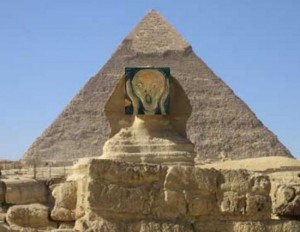Analysis: Don’t panic over Egypt, yet

What does the future hold for the Israel-Egypt relationship? Will Egypt become increasingly, openly hostile? Will the Camp David Peace Accords between the two neighbors hold? Will Egypt provide diplomatic and security cover for Hamas in Gaza? How will the central government in Cairo, whoever it turns out to be, handle the growing lawlessness of the Sinai Peninsula?
These are just some of the important questions people are asking themselves regarding the important relationship between Israel and Egypt since the overthrow of the Mubarak regime. They are coming up again today as the Egyptian national gas company unilaterally terminated its contract with Israel.
The first, most pressing issue is the constant stream of terror from the Sinai, and its strategic implications for both countries. Sinai is three times the size of Israel. It is a vast badlands that is becoming a serious strategic headache for Israel. The central government in Cairo has lost control of the territory, which is now rife with armed Bedouin groups and Islamic fundamentalist cells. The two are mixing and influencing each other for the first time, and the result is noxious. The Bedouins have traditionally not been Islamic fundamentalists, and that could be changing. Israeli military intelligence has revealed that the IDF has thwarted about 10 terror plots being hatched in the Sinai. That’s a lot. Israel will find it increasingly difficult not to enter the Sinai in force and take care of the problem. But if Cairo doesn’t take care of the problem, we might have to. And that could lead to the dreaded confrontation between Israel and Egypt. This might even be what the various terror groups in Gaza and the Sinai are aiming for.
The peace treaty with Israel will not likely be abrogated, but the border will not be quiet. There are those who believe that it is inevitable that the Muslim Brotherhood and the Salafists take control over all Egypt. I wouldn’t rush into this conclusion. The Egyptian military has in its hands all of the powers of the Presidency, and the Parliament is not in control of the country yet. One of the main bones of contention now in Egypt between the military and the Islamists is over who will write the country’s new constitution. So far, the military has not allowed the Parliament to determine the nature of the new constitution, and it is unlikely that they will allow this in the future. In the impossible economic and diplomatic situation that Egypt finds itself in today, the military cannot allow the Islamists to create the conditions for an Islamic state governed by Sharia Law, devoid of tourism, development, international investment, and antagonistic to the West.
Egypt is on the brink of economic meltdown: tourism has taken a huge hit and their oil reserves are spent. There is a reduction in the number of ships passing through the Suez Canal because of piracy and the attendant rise in insurance costs, and in addition, the canal is still not able to support the passage of very large tankers. Add to this the recent uptick in the demands of African nations to change the Nile Waters Agreement status quo, especially South Sudan, which is demanding a redistribution of water. According to Reuters, the Egyptian government has spent more than $20 billion in foreign reserves to prop up the country’s currency since last year’s uprising. Reserves fell by another $600 million in March to $15.12 billion, equivalent to less than three months of imports.
Internal security issues, and political instability are also a challenge for the authorities. Add all of this together, and you get a picture of a country in trouble, with the ruling military council wanting desperately not to allow a slide into the abyss. Field Marshal Tantawi, the de facto ruler of Egypt, and his mates get the picture. They are not inclined to let the Salafists and the Muslim Brotherhood take total control of Egypt, and they are not inclined to let Egypt slide into war with Israel. They may be inclined to play into the Egyptian street’s hatred of Israel, just a little bit, to gain some brownie points ahead of some tough economic and political decisions, and that’s what we may be seeing with regard to the gas deal stoppage. A change in the constitution, a halt to US military and financial aid, this is too high a price for the Egyptian military. There are enough actors in Egypt who want to avoid a total Islamist takeover.


Many thanks so much for this! I¡¯ve not been this moved by a web site publish for quite some time! You might have obtained it, whatever that means in blogging. Anyway, You¡¯re unquestionably someone that has something to say that folks require to hear. Sustain the superb work. Hold on inspiring the individuals!
This is very interesting, You¡¯re a very skilled blogger. I have joined your feed and look forward to seeking more of your great post. Also, I have shared your site in my social networks!
Good writing skills take more than just education. It¡¯s passion that sets the good and great writers apart. I see you have passion and skills.
I was just seeking this info for a while. After 6 hours of continuous Googleing, finally I got it in your web site. I wonder what¡¯s the Google¡¯s problem that doesn¡¯t rank this kind of informative sites closer to the top. Generally the top web sites are full of garbage.